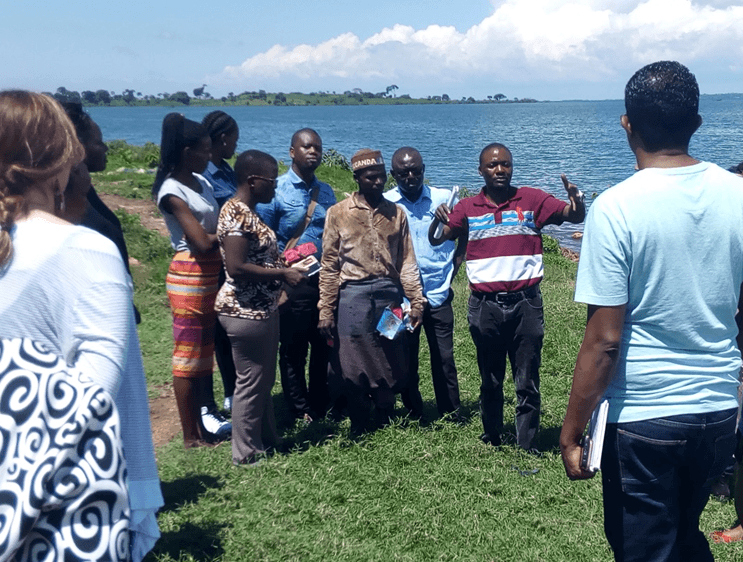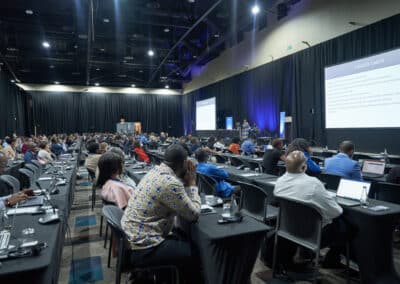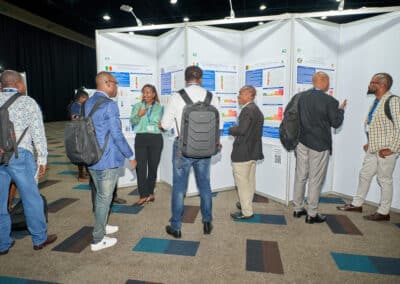In June 2018, CQUIN supported teams from Eswatini, Kenya, and Malawi to visit Uganda on a joint south-to-south learning exchange hosted by the Uganda Ministry of Health National AIDS Control Program. From June 10-14, the teams visited The AIDS Support Organization (TASO), a pioneer in Uganda’s HIV/AIDS response. The exchange included three field visits to observe Community Drug Distribution Points (CDDP) and Community Client-Led ART Delivery (CCLAD) and facility based DSD models.
The teams learned about the implementation of facility- and community-based differentiated service delivery (DSD) models for people living with HIV in urban and rural settings; community engagement and demand creation; and how community-based ART service delivery data flows into the national monitoring and evaluation system. Each team identified challenges and opportunities to adopt or adapt from TASO’s DSD models for use by their country’s DSD program.
“The CDDP model is unique,” said Dr. Hervé Nzereka Kambale, differentiated care advisor for the Eswatini National AIDS Programme (SNAP). “Clients have group appointments—it’s a combination of the outreach and community ART group models. Also, blood specimens are collected from recipients of care when they’re due for viral load testing.”
At every TASO-managed service delivery point, whether in community or at a health facility, recipients of care are an integral part of the team. These individuals living with HIV are involved in triaging, TB screening, counseling, pre-packing ARVs, and collecting and documenting basic client data such as measuring mid-upper arm circumference (MUAC).
TASO health centers provide a comprehensive package of services for HIV prevention, treatment, and support, and aim to deliver services centered on recipients of care. “We have a human-rights based approach to HIV care and treatment,” said Dr. Bakashaba. “It’s a client’s right to access quality services. Meaningful participation means clients should be part of the design, planning, implementation, and provision of services.”
That ethos informs much of what TASO does. For example, every quarter, TASO conducts a client satisfaction survey to inform their DSD. Health care workers at TASO actively screen their clients to identify signs of gender-based violence—a contributor to poor ART adherence. They also actively track utilization of viral load results, ensuring monthly review of clients with unsuppressed viral loads. If their viral load is unsuppressed, health care workers add a red sticker to their file and they receive intensive adherence counseling, home visits, and close monitoring for three months. Clients whose viral load is suppressed upon retesting are eligible to join or rejoin a DSD model of their choice; the red stickers are removed from the file and pasted on a “wall of fame.”
At TASO programs, the community of people living with HIV are involved in demand creation at all levels, and there is a client council involved in policy design and implementation. The organization is also actively involved in research and program implementation to strengthen the Ugandan health system.
The TASO program has a very efficient M&E systems that ensures high data quality and proper accountability of ARVs that goes into the communities for distribution. “Roles and responsibilities are clearly delineated, which guarantees that data from patients receiving services in the community enters the national M&E system within 72 hours of a CDDP meeting,” said Dr. Caesar Mafabi, center program manager at TASO Mulango.
Based on their observations, the visiting teams developed action plans to execute once they return to their countries. Each team is considering opportunities to adapt aspects of the TASO models of care within their health care delivery systems. For example, the Eswatini team plans to have medicines pre-packaged at the health facility prior to outreach visits, and to conduct a client-satisfaction survey targeting community-support organizations and people living with HIV.
“A model similar to CDDP was included in the draft standard operating procedures to strengthen DSD for key populations in Eswatini,” Dr. Kambale explained. “We want to initiate an ARV pre-packing system at the health facilities prior to the outreach visits, and we’ll provide this service at a fixed outreach site where we’ll include ART-initiation and pill pick-up into the existing package of care.”
The Malawi team also plans to use what they learned from TASO’s CCDP model, adapting it to a community ART-led provider model. This model, where a nurse or clinician takes the complete ART package to the patients in the community for their refills and monitoring, was recently included in their revised 2018 HIV Care and Treatment Guidelines. According to Stanley N’goma, care and treatment officer at the Malawi Ministry of Health, the Ministry plans to work with partners and community-support organizations that can help implement service delivery in the communities that will be directly linked to the facilities for easy referral.
Learn more about DSD in Uganda, Eswatini, Kenya, and Malawi.
This story is part of a series focused on the evolution of the CQUIN network, and countries’ progress in improving differentiated service delivery. To follow this story and others, sign up for the network’s monthly newsletter.






